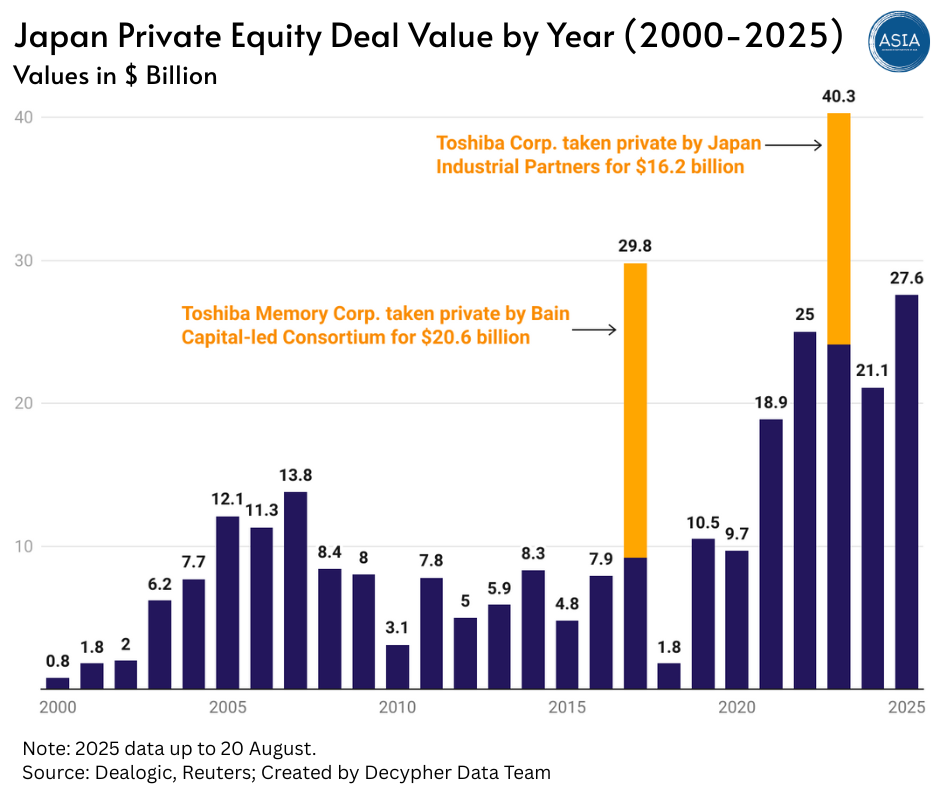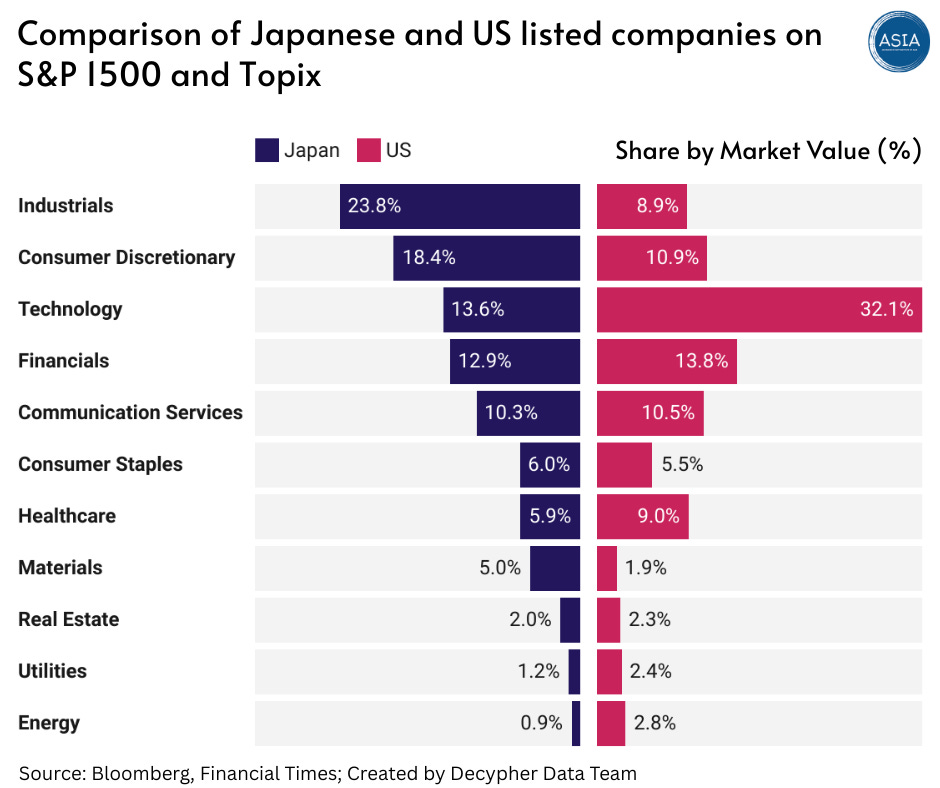China and The World: Xi-Trump Meeting, Japan’s New Leadership, Push for Tech Self-Reliance
This week in China, we explore key shifts in its domestic and foreign policy landscape. We also expand our coverage to look at the key developing international stories.
China Quote 🗩
“Currently, the world is undergoing profound changes, a once-in-a-century transformation, with a complex and volatile international landscape, and increasing instability and uncertainty facing the Asia-Pacific region… the more turbulent the times, the more we must work together in solidarity.”
- Xi Jinping in his speech at the APEC
Are Times A’Changin for Japan?
Japan’s election of its first female Prime Minister – Sanae Takaichi in October is undeniably historic. It is a rupture in a political culture that is deeply misogynistic and dominated by men with highly conservative gender norms in place.
Japan does not have the best track record when it comes to gender equality as evidence by its consistently low ranking in the Global Gender Gap Index released by the OECD. It has ranked 118th out of 146 countries and does not do well on other such indices as well. Women hold less than 15% of seats in the lower house of the parliament and gender reforms remain greatly opposed in society.
Thus, the election of a female head of state is a monumental step for the country. However, this victory represents a far more complex picture. The question that emergers is not whether a woman holds office, but whether the politics she ascribes to and the leadership she represents advances structural transformation in Japanese society.
Sanae Takaichi’s election must be situated within the dual edifice of symbolic representation and substantial equality. Symbolically, Takaichi allows for Japan’s political establishment to appear more gender friendly. Given that her political career has evolved in an environment where political leadership, ambition and authority were significantly male – her election offers a shift in the national imagination towards women being in positions of power.
However, this representation comes without any significant redistribution of power, opportunity or even resources – it is a consequence of the politics of tokenism. Takaichi’s cabinet, despite the ruse of inclusivity, includes two women out of nineteen ministers. She opposes issues like same-sex marriage following in line with the more dogmatic ideas of Japanese society. She has publicly opposed allowing women to retain their surnames after marriage. She is an advocate for male-only imperial succession, which consolidates male primacy as a cultural norm and preserves patriarchal traditions.
Takaichi’s political career exposes the working of a gendered dynamic in political survival. For her to survive in a deeply conservative political system, she must reinstate her ideological loyalties time and again. Whether it be her hardline stance on defence, nationalism or family ethics, these are compensatory tactics adopted to ascertain credibility in masculine political cultures. This performative conservativism elevates the idea that gender is not simply a demographic concern but rather a systemic problem that goes beyond tokenism.
Her political lineage and ideological leanings are a product of her close association with the Liberal Democratic Party (LDP). A protégés of the late Japanese Prime Minster Shinzo Abe, she continues to promote traditionalist politics aimed to preserve patriarchal institutions. This conservatism is dangerous as it reinstates the idea that women can succeed in formal politics only if they fall in line with masculine-coded leadership styles, limiting the radical potential of female leadership.
This reality does not do away from the emancipatory potential of Takaichi’s political leadership. Most changes begin with symbolic representation where societal narratives alter before structural barriers. Female participation in public life may improve with Takaichi’s presence as the head of state. More women would run for office and perhaps in the longer run, the association of formal power with masculinity and leadership would erode. However, this needs to be substantiated with issues like wage gaps, care burdens, discriminatory labour practices and the lack of political networks and avenues for non-male members to be addressed. It is only then that a transformative potential for Japan can be envisioned towards a more gender inclusive society.
Japan is gripped with structural stagnation and an aging population with rigid bureaucratic systems. It is heavily dependent on export-led growth and conservative fiscal policies. The LDP’s close connection with the ruling economic elite of the country is no secret, leaving Japan with limited room for policy flexibility. Takaichi’s term as prime minister will have to address economic revival, defence modernization and balancing regional relationships. She will need to balance diplomatic ties with the United States, while ensuring Japan’s autonomy is not lost.
Within this landscape, Takaichi is clear on her engagement strategy that is based on the primacy of economics and security. She has rallied around semi-conductors, defence technology and securing supply chains. She wants Japan to be self-sufficient in critical sectors. Secondly, she seeks to increase Japan’s defence spending to align with NATO’s 2% GDP benchmark. She has close relations with the Self-Defence Forces and her advocacy for a constitutional revision indicates a more Hawkish security stance.
In essence, Japan’s newest administration under Prime Minister Sanae Takaichi is at a crossroads between reform and representation. The Prime Minster can redefine gendered power in a highly unequal democracy or fall in line with the conservatism that defines Japan. While breaking the gender ceiling, she is expected to embody masculinist governance stances – hawkish security, technocratic revival and policy continuity rather than a new vision.
US vs BRICS: One Battle After Another
In recent months the posture of the United States towards the BRICS alliance has created unintended consequences. Rather than weakening the grouping, Washington’s assertive economic and strategic signals are serving to reinforce BRICS as a counter-current to U.S. dominance.
At its core the BRICS coalition (originally Brazil, Russia, India, China, South Africa) has long sought a more balanced global governance system, less bound to Western-led institutions. Its recent expansion to include states such as Iran, Saudi Arabia and the United Arab Emirates has amplified its reach and signalled more ambition. One area of particular concern for Washington is BRICS’ push to reduce dependence on the U.S. dollar-centred financial architecture. For instance, mayors and city officials gathered in Moscow on 28 October to sign a pact aiming to coordinate local and national de-dollarisation steps.
This moment raises a critical question: is the United States, through its policy stance, driving BRICS to become an overtly anti-American bloc? The answer, while not definitively “yes”, nonetheless suggests that Washington’s tactics risk strengthening exactly the alignment it aims to prevent.
Consider three key dynamics. First, U.S. trade and financial pressure – including threats of tariffs on countries that align with “anti-American” BRICS policies – create an external stimulus for cohesion among otherwise diverse members. Reporting suggests that Washington’s threat of a further 10 per cent tariff on nations aligning with BRICS policies was one such instance.
Second, BRICS’ own agenda is increasingly ambitious: from local currency settlement systems to coordination of major development institutions. The Moscow pact is emblematic of a deeper shift in financial architecture.
Third, the grouping offers its members strategic cover and alternatives. In effect, states facing American pressure may calculate that it is safer to align with BRICS initiatives than remain dependent on U.S. goodwill or dollar-based trade flows.
That said, the picture remains more nuanced than a simple binary of West versus East. Many BRICS parties remain cautious about being cast into an “anti-American” coalition. Analysts note significant internal heterogeneity and question whether BRICS can act as a coherent bloc. Some members value the flexibility of BRICS as a hedge rather than an adversary front.
For the United States the risk now is two-fold. One, continued heavy-handed economic pressure may drive reluctant states deeper into BRICS orbit and accelerate its institutionalisation. Two, Washington’s narrative of defending global order may be undermined if it is seen principally as enforcing unilateralism rather than offering cooperative alternatives.
In short, Washington may be unintentionally doing the heavy lifting required to solidify BRICS as a structural counter-weight. The alliance may not yet have the military or ideological coherence of classic blocs, but its growing financial and governance ambitions point toward a more consequential posture. The United States thus faces a challenging pivot: to avoid building the very bloc it fears, it must recalibrate towards engagement rather than confrontation.
In effect, U.S. policy is not only shaping the agenda of BRICS – it is helping to weld its members together. Whether BRICS evolves into a genuinely anti-American bloc remains an open question. But the architecture being constructed under its auspices and the responses provoked by Washington make it clear that the stakes are rising.
Economic Activity🏦
Outcomes of Trump–Xi meeting: trade pause but no breakthrough
Sinocism reports that the Trump–Xi summit in South Korea yielded a temporary truce, with both sides agreeing to suspend key trade restrictions for a year. China will pause enforcement of rare earth export controls, while the US will halt expansion of its Entity List rule and cut fentanyl-related tariffs from 20% to 10%. Beijing also pledged to resume large-scale soybean purchases. However, no deal was reached on US semiconductor exports, including Nvidia chips, and analysts caution that the pause does not mark a fundamental thaw in US–China relations.
India grants firms licences to import rare earths from China
Economic Times reports that several Indian companies have been issued licences to import rare earth minerals from China following the easing of export restrictions agreed at the Trump–Xi summit. The External Affairs Ministry confirmed the development but refrained from commenting on strategic implications, as the imports are expected to support India’s electronics and renewable energy industries.
China pledges major push to raise household consumption
Bloomberg reports that Beijing has vowed to “significantly” increase the share of household consumption in its economy as part of a new growth strategy. The pledge, made at a top State Council meeting, comes amid weak domestic demand and efforts to reduce reliance on exports and infrastructure investment.
China banks on institutional strength for next five-year plan
South China Morning Post reports that Beijing is preparing to rely more heavily on its institutional and administrative systems to deliver the 15th Five-Year Plan (2026–2030). Analysts say the focus reflects a shift from stimulus-driven growth towards governance efficiency, coordination across ministries, and policy discipline under the central leadership.
Why China continues to outmanoeuvre the US in the trade war
American Enterprise Institute argues that despite repeated tariff escalations, China has managed to sustain export competitiveness and attract foreign investment through supply-chain resilience and industrial upgrading. The piece contends that U.S. measures have failed to dent China’s trade surplus, while American firms face rising costs and limited market alternatives.
Trump’s tariff strategy risks pushing Southeast Asia closer to China
Financial Times reports that President Donald Trump’s new tariff regime and aid cuts have strained Washington’s relations with Southeast Asian nations, long seen as key partners in countering Beijing. While Trump signed trade and minerals deals with ASEAN members during his visit to Malaysia, many in the region view U.S. policy as increasingly transactional. Analysts warn that as tariffs disrupt supply chains and China deepens its diplomatic outreach, Southeast Asia may tilt further toward Beijing’s economic and strategic orbit.
Xi’s authority reaffirmed as China doubles down on tech self-reliance
Chatham House reports that China’s latest top leaders’ meeting reinforced President Xi Jinping’s dominant role ahead of the 15th Five-Year Plan. The session emphasised technological self-reliance as a national priority, highlighting investments in semiconductors, AI, and green tech as key to reducing dependence on Western supply chains.
EU accelerates plans to reduce reliance on Chinese rare earths
Reuters reports that the European Union has unveiled new measures to diversify supplies of rare earth minerals, aiming to cut dependence on China amid rising geopolitical tensions. The plan includes strategic stockpiling, expanded partnerships with African and Australian producers, and incentives for domestic processing and recycling industries.
Inside China🐉
China on track to land astronauts on the Moon by 2030
ABC News reports that China’s space agency has confirmed plans to land its first astronauts on the Moon by 2030, marking steady progress in its crewed lunar programme. The mission will use the Long March-10 rocket and Mengzhou spacecraft, as Beijing seeks to establish a long-term presence and rival U.S. ambitions under NASA’s Artemis programme.
China and the World🌏
Spain deploys King Felipe VI in bid to deepen China ties
Financial Times reports that Spain will send King Felipe VI to China in November, marking the first visit by a European monarch in seven years and signalling Madrid’s intent to strengthen relations with Beijing despite U.S. unease. The trip, backed by Prime Minister Pedro Sánchez’s government, comes as Spain seeks Chinese investment in sectors such as electric vehicles and manufacturing.
Japan and China hold first high-level security dialogue in four years
NHK World reports that senior Japanese and Chinese officials met in Tokyo for their first high-level security talks since 2021. The discussions covered maritime tensions, Taiwan, and defence policies, with both sides agreeing to maintain dialogue despite persistent mistrust. Tokyo urged restraint over military activity near Japanese waters, while Beijing called on Japan to avoid actions seen as aligning too closely with US strategy.
China urges Japan to respect its security concerns amid Tokyo’s defence buildup
Anadolu Agency reports that Beijing has called on Tokyo to “earnestly respect” China’s security interests after Japan reaffirmed plans to strengthen its defence capabilities. The Chinese Foreign Ministry said Japan’s military expansion risks heightening regional tensions, while Japan insists its actions are in response to an increasingly complex security environment in the Indo-Pacific.
Vatican urges China to play role in bringing peace to Ukraine
ANSA reports that the Vatican has appealed to China to use its global influence to help end the war in Ukraine. The call came during renewed diplomatic exchanges, with Vatican officials emphasising that Beijing’s engagement could be key to advancing dialogue between Russia and Ukraine and achieving a lasting ceasefire.
UAE firm accused of supplying tech used to upgrade Chinese missiles
Middle East Eye reports that US intelligence gathered in 2022 suggests an Emirati AI group, widely named as G42, may have provided technology that reached Huawei and was used to upgrade Chinese long-range air-to-air missiles, reportedly improving range and targeting. G42 has denied the allegations and the revelations have intensified US concern about technology flows from Gulf partners to China.
China conducts large-scale naval drills near Taiwan ahead of local elections
Focus Taiwan reports that China carried out extensive military exercises around Taiwan’s eastern and southern waters, involving warships, fighter jets, and drones. The drills, which Beijing said were aimed at testing “combat readiness,” come weeks before Taiwan’s local elections and have been condemned by Taipei as a coercive move intended to influence the vote.
China’s luxury food industry reshapes global fine dining
Bloomberg reports that Chinese producers of caviar, foie gras, and truffles are increasingly dominating the global gourmet market, challenging traditional European suppliers. Rising quality standards, government support, and expanding export networks have made China one of the largest exporters of high-end ingredients, reshaping menus in Michelin-starred restaurants worldwide.
How an ancient Chinese state once mediated between powers
South China Morning Post explores how the ancient Chinese state of Zheng, during the Spring and Autumn period (770–476 BC), navigated survival by mediating between larger powers — a role likened to modern Singapore’s diplomatic balancing act. Historians note that Zheng’s strategy of neutrality, diplomacy, and economic pragmatism offers lessons for small states managing great-power rivalries today.
Tech in China🖥️
Nio’s mass-market pivot threatens its premium brand
Financial Times reports that Chinese electric-car maker Nio, once hailed as a domestic rival to Tesla, is struggling to sustain growth amid a narrowing luxury EV market. The company posted a $720 million loss in the second quarter despite delivering 222,000 vehicles last year and plans to launch a lower-cost sub-brand to offset fixed costs. Analysts warn the move could dilute Nio’s premium image, as China’s EV sector shifts from hype to cost efficiency and consolidation.
Global Risk🗺️
Lakshmi Mittal’s energy firm bought Russian oil shipped on US-blacklisted vessels
Economic Times reports that an energy venture backed by Indian billionaire Lakshmi Mittal purchased Russian crude transported on tankers sanctioned by the US Treasury. Shipping data reviewed by Reuters shows at least two cargoes were delivered this year via vessels flagged for breaching the G7 price cap, raising questions over compliance risks for Indian refiners amid tightening Western scrutiny of Russian oil trade.
Takaichi pledges a “new golden age” for US-Japan ties
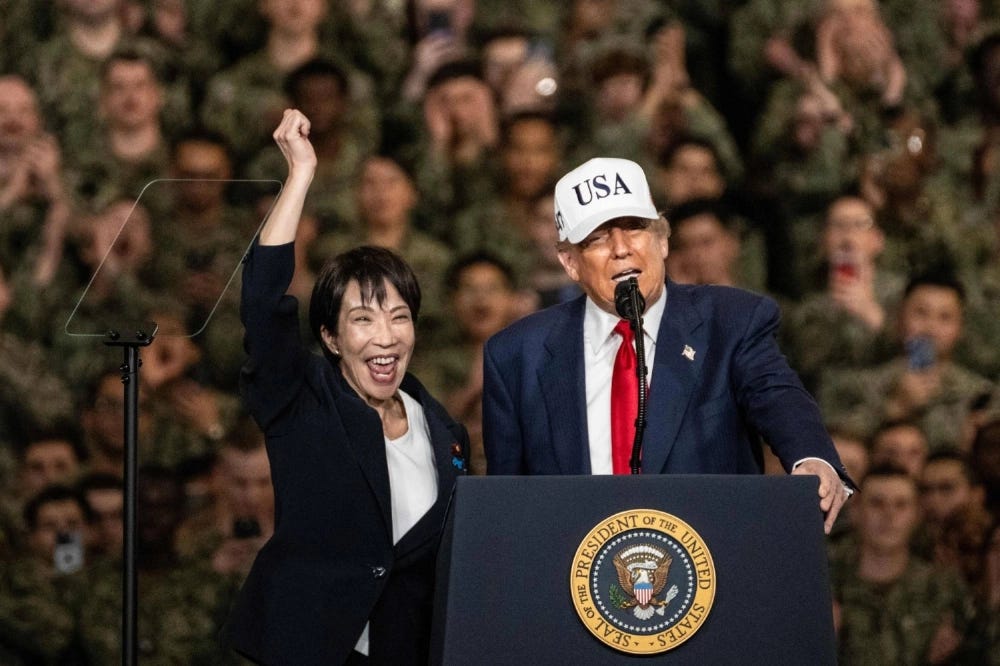
The Japan Times reports that Prime Minister Sanae Takaichi and President Donald Trump held summit talks in Tokyo on 28 October 2025, with Takaichi pledging to strengthen the alliance and raise Japan’s defence contribution toward a 2% of GDP target. The leaders signed a framework on critical minerals and rare earths and highlighted a Japan–US investment initiative, while Takaichi said she would nominate Trump for the Nobel Peace Prize and promised closer economic and security coordination.
Arab states resist US-backed plan for Tony Blair to lead Gaza transition
European Business Magazine reports that a US-supported proposal to appoint former UK prime minister Tony Blair as head of a Gaza International Transitional Authority has drawn sharp opposition from Arab governments, which view the plan as foreign interference. Egypt, Saudi Arabia, the UAE, Qatar, Jordan and Turkey have voiced concerns that Blair’s role would undermine Palestinian sovereignty and entrench Gaza’s separation from the West Bank. Arab diplomats cited his Iraq War legacy and alignment with Western and Israeli interests as reasons for distrust.
Can Pakistan’s military strongman fix a failing nation?
Financial Times reports that Field Marshal Asim Munir has tightened his grip on Pakistan while seeking backing from the US and China after a brief war with India. Though an IMF-led recovery offers respite, critics warn that his centralised military rule risks deepening repression and economic fragility.
Racist attacks on UK public transport surge 67% in three years
New Statesman reports that racially and religiously aggravated crimes on British transport networks have risen 67% since 2022, with over 2,600 incidents recorded so far this year. Analysts link the spike to increasingly hostile political rhetoric on immigration, reflecting a shift from covert prejudice to open public racism.
Abe’s accused assassin pleads guilty, Japanese media report
Bloomberg reports that Tetsuya Yamagami, accused of assassinating former Japanese prime minister Shinzo Abe in July 2022, has pleaded guilty to murder and firearms charges at the start of his trial in Nara. The killing, carried out with a homemade gun, shocked Japan and prompted a national debate on political security and the influence of the Unification Church, which Yamagami said he targeted due to its links with Abe’s party. Prosecutors are seeking a life sentence, with the court expected to issue a verdict early next year.
Russia tests nuclear-powered Burevestnik missile with 14,000 km range
Reuters reports that Russia has successfully tested its nuclear-powered Burevestnik cruise missile, which President Vladimir Putin says can bypass any missile defence system. The missile flew for 14,000 kilometres over 15 hours during the October 21 test, according to Russia’s top general Valery Gerasimov. Putin said the weapon’s “crucial testing” phase is complete and infrastructure for deployment will follow, signalling Moscow’s intent to strengthen nuclear deterrence amid heightened tensions with the West.
Pro-Kremlin commentator Tetiana Montian labelled “terrorist and extremist” in Russia
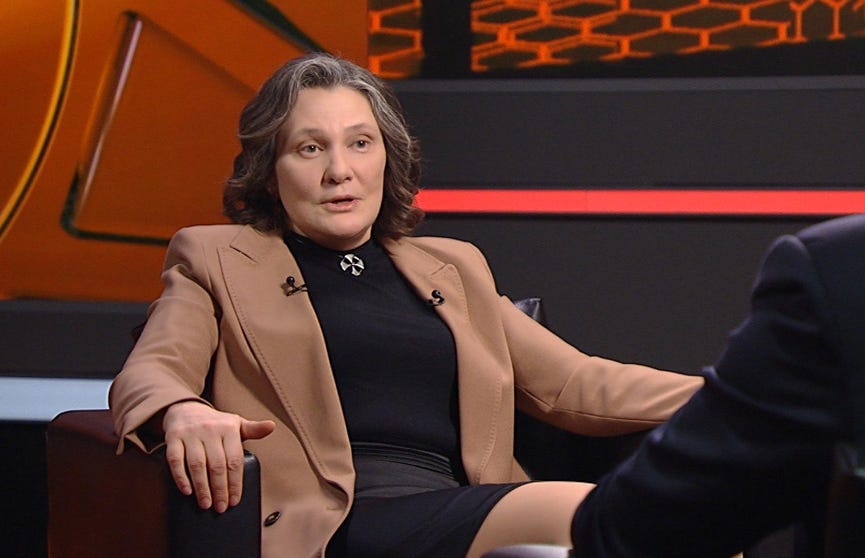
The Insider reports that Ukraine-born Russian propagandist Tetiana Montian has been added to Russia’s official list of “terrorists and extremists” by the Federal Financial Monitoring Service. Montian, a former RT contributor who publicly backed Moscow’s invasion of Ukraine, moved to Russia in 2021 after years of pro-Kremlin advocacy. The reasons for her designation remain unclear, though censorship official Ekaterina Mizulina said her organisation had filed a complaint over posts “discrediting the army.”
Russia moves to label Navalny’s Anti-Corruption Foundation a terrorist organisation
The Insider reports that Russia’s Prosecutor General has asked the Supreme Court to designate the US-registered Anti-Corruption Foundation (ACF), founded by the late opposition leader Alexei Navalny, as a “terrorist organisation.” The closed-door hearing is set for November 27. The ACF, already labelled a foreign agent and extremist group, said the move aims to further cripple its international work. Analysts warn that the designation could trigger asset freezes and restrictions abroad, tightening Moscow’s crackdown on dissent.
Russia sidelines summit as Middle East influence wanes
The Insider reports that Moscow postponed its planned Russia–Arab summit after Arab leaders prioritised US-led Gaza diplomacy, highlighting Russia’s diminished clout in the region. While seeking to retain its bases and ties with Syria’s new leadership, the Kremlin has largely stepped back as Washington and regional powers shape the post-war order.
Orbán’s stronghold shaken as satirical party wins over disillusioned voters
Financial Times reports that Hungary’s ruling elite has been embarrassed by Gergely Kovács, mayor from the satirical Two-Tailed Dog party, who broke Fidesz’s decades-long grip on Budapest’s richest district. His reforms cut procurement costs by up to 60%, fuelling hopes that anti-corruption momentum could challenge Viktor Orbán’s dominance in next year’s elections.
Nvidia takes $1 billion stake in Nokia, forming 6G and AI partnership
CNBC reports that Nvidia will invest $1 billion in Nokia, sending the Finnish telecom firm’s shares up 22%. The deal includes a strategic partnership to co-develop 6G and AI networking technologies, with Nokia adapting its software for Nvidia chips as both companies deepen collaboration in next-generation communications.
Asia markets rise after Trump-Xi trade truce; Japan hits record high
CNBC reports that Asian markets mostly gained after the Trump-Xi trade truce eased tensions over rare earths, with Japan’s Nikkei surging over 2% to a record high. China’s manufacturing PMI, however, slipped to 49, its lowest since May, signalling continued factory weakness despite the diplomatic breakthrough.
Oil glut enables Trump to sanction Russia’s top producers
Financial Times reports that President Donald Trump imposed sanctions on Rosneft and Lukoil, Russia’s two biggest oil firms, as global crude prices hit a five-month low near $60. The energy surplus gave Washington room to tighten pressure on Moscow without spiking fuel costs, marking a shift from earlier restraint under Biden. The move, backed by European allies and supported by Saudi Arabia’s output boost, aims to cut Russia’s war revenues while keeping inflation in check.
US inflation eases slightly in September
Reuters reports that US consumer prices rose less than expected in September, signalling a continued cooling of inflation. The consumer price index increased modestly as housing and energy costs stabilised, reinforcing expectations that the Federal Reserve may keep interest rates steady in the near term.
The Moral Economy of the Far Right
The Ideas Letter reports that far-right thinkers such as Alain de Benoist, Alexander Dugin, and Guillaume Faye recast anti-capitalist ideas into an exclusionary “moral economy” that rejects equality and globalisation in favour of hierarchy, cultural homogeneity, and civilisational autarky. Their vision subordinates markets to the moral purpose of the ethno-state, replacing welfare with “organic” social solidarity and promoting protectionist blocs like “Eurasia.”
South Korea announces lowering of tariffs as part of new US trade deal
BBC News reports that US and South Korea finalised a broad trade deal that cuts reciprocal tariffs from 25% to 15%. Seoul will invest $350bn in the US, including $200bn in cash and $150bn in shipbuilding, and buy $100bn of liquified natural gas. President Trump hailed the agreement as “pretty much finalised,” framing it as part of a wider push for economic and national security alignment ahead of his upcoming meeting with China’s Xi Jinping at the Apec summit in Gyeongju.
Iran’s solar capacity reaches 1,000 MW milestone
PVKnowHow reports that Iran has added over 1,000 MW of solar power to its national grid as part of a strategy to reduce dependence on fossil fuels and expand renewables. Major projects include a 200 MW solar farm in Yazd and a 150 MW plant in Hamedan, alongside over 1,600 MW from smaller plants. Backed by state utility TAVANIR, the programme seeks to attract private and foreign investment, leveraging Iran’s high solar potential to strengthen energy security, create jobs, and position the country as a regional leader in green energy.
US signs $80 billion pact with Westinghouse for new nuclear reactors
Bloomberg reports that the Biden administration has finalised an $80 billion agreement with Westinghouse Electric to build a new generation of small modular nuclear reactors across the United States and allied countries. The deal aims to boost domestic clean energy capacity, reduce reliance on fossil fuels, and strengthen energy partnerships with Europe and Asia. Officials said the reactors will support decarbonisation goals while creating tens of thousands of jobs, marking one of the largest nuclear energy investments in US history.
Belgium ‘at risk of becoming a narco-state’, warns judge
The Times reports that a senior judge in Antwerp has warned that Belgium is on the verge of becoming a “narco-state”, citing the deep infiltration of drug cartels into law enforcement and the judiciary. The anonymous open letter, published on the judiciary’s official website, describes “extensive mafia structures” that have corrupted public institutions amid rising cocaine trafficking through Antwerp’s port. Judicial sources said several officials have received threats from traffickers, underscoring the scale of organised crime’s reach.
$200 million-an-hour IPO boom transforms India’s stock market
Bloomberg Law reports that India has become one of the world’s hottest IPO markets, with offerings like LG Electronics India’s $1.3 billion issue selling out in just six-and-a-half hours. Total proceeds are set to approach last year’s $21 billion record as strong demand from domestic mutual funds, insurers, and retail investors fuels the surge. The boom underscores the deepening role of local capital in India’s markets amid global investor diversification and economic resilience.
Tech firms urge Chile to ease proposed AI regulations
Bloomberg reports that global technology companies have called on Chile to soften its draft artificial intelligence law, warning that strict liability and transparency rules could stifle innovation. The proposal, which would make firms legally responsible for harms caused by AI systems, has drawn concern from Microsoft, Google, and local start-ups. Chile’s government says the legislation aims to ensure accountability and ethical use of AI, positioning the country as a regional leader in AI governance.
Saudi Arabia aims to export AI as its next global power play
The New York Times reports that Crown Prince Mohammed bin Salman is positioning Saudi Arabia as a major exporter of artificial intelligence capacity, investing billions in massive data centres to supply global developers. Backed by the kingdom’s cheap energy and sovereign wealth, the new state-run firm Humain seeks to handle 6% of the world’s AI computing workload, trailing only the US and China. Riyadh is courting firms like OpenAI, Nvidia and Amazon while balancing ties with both Washington and Beijing. Critics question whether Saudi Arabia’s limited AI talent and geopolitical tensions could derail its ambitions.
Decypher Data Dive📊
Japan’s private equity market is expanding swiftly as global investors view it as the next major frontier. Between January and August 2025, private equity deals reached $27.6 billion nearly triple the $9.5 billion recorded during the same period in 2024, according to Dealogic. The sector has become more sophisticated, with an estimated 150 to 200 private equity firms now operating in Tokyo.
Japan’s market is heavily weighted toward Industrials (23.8%) and Consumer Discretionary (18.4%), showing the country’s strength in manufacturing, automobiles, and related industries.
Image of the Week📸
Trump and Xi finally meet!
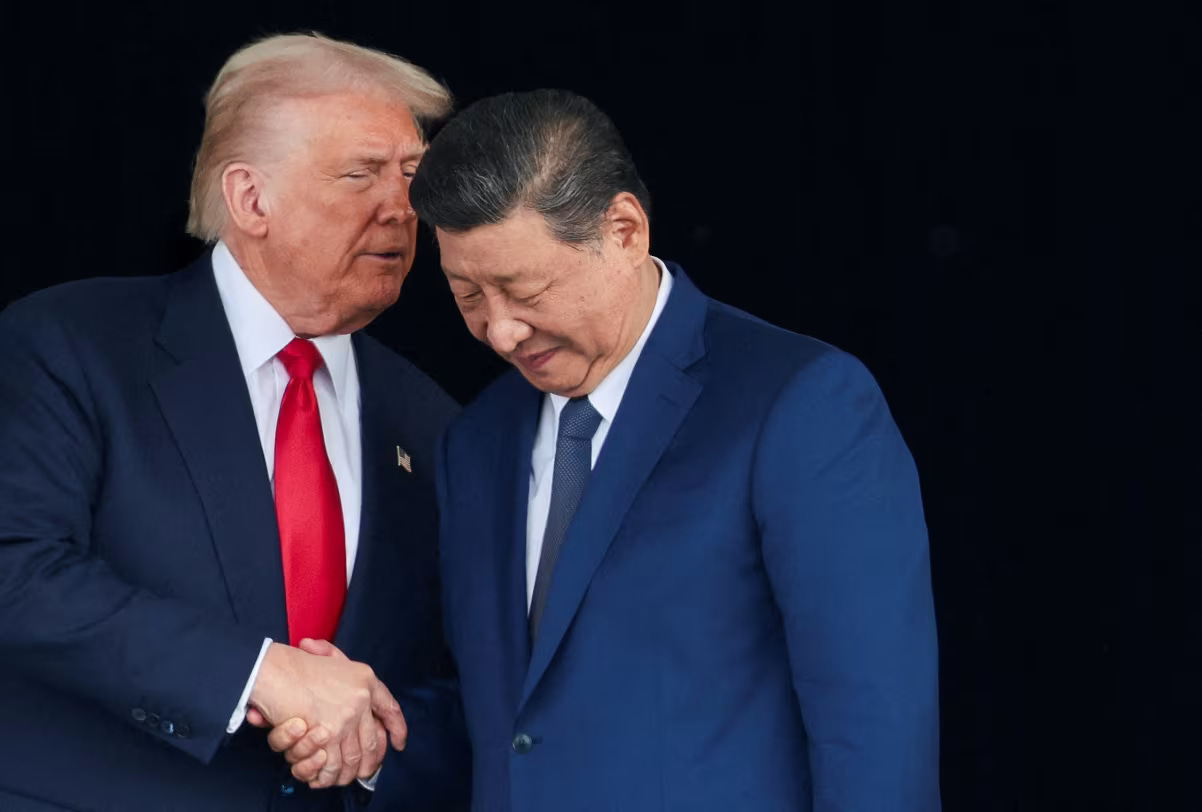
— — —
Microessays by Priyanka & Aurko
Data By Bhupesh
Edited By Aurko
Produced by Decypher Team in New Delhi, India
— — —


